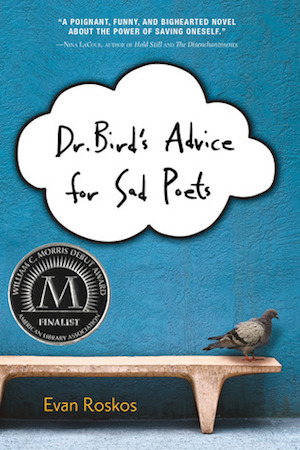Note: This review is part of the 2016 Summer Reading Diversity Spotlight.
Dr. Bird’s Advice for Sad Poets by Evan Roskos
Release Date: March 5, 2013
Publisher: HMH Books for Young Readers
Genre: Young Adult Contemporary, Mental Illness
ISBN: 978-0547928531
Source: Library
Add it to Goodreads
“I hate myself but I love Walt Whitman, the kook. Always positive. I need to be more positive, so I wake myself up every morning with a song of myself.”
Sixteen-year-old James Whitman has been yawping (à la Whitman) at his abusive father ever since he kicked his beloved older sister, Jorie, out of the house. James’s painful struggle with anxiety and depression—along with his ongoing quest to understand what led to his self-destructive sister’s exile—make for a heart-rending read, but his wild, exuberant Whitmanization of the world and keen sense of humor keep this emotionally charged debut novel buoyant.
***
I knew that I would enjoy Dr. Bird’s Advice for Sad Poets so I don’t really have an excuse as to why it’s taken me so long to finally sit down and read this book. But I am so, so glad that I finally took the plunge.
I loved following James, a teen who is trying to put the pieces together and cope with his sister being both expelled from school and kicked out of the house. On top of that, he’s got his own issues and seeing this all play out with the help of Walt Whitman and James’s imaginary therapist, Dr. Bird was such a treat. This book was such a hoot!
Dr. Bird’s Advice for Sad Poets is unapologetic in every way. From its raw and authentic teen dialogue to its exploration of mental illness in families and the support that some people simply do not get no matter what they do to cry out for it, this book is legit one of the most truthful and heartbreaking and heartwarming representations of this subject matter, period. It’s unapologetic in its messiness, James, a character who is just as naive (as teenagers are) and lost as he is insightful. It’s true.
What’s so wonderful about the way that this story is told is that one moment, you’ll be smiling and laughing and the next, you’re as broken as a bird who’s injured its wings. Evan Roskos has managed to put down on paper so clearly how I feel, how I’m sure so, so many people, children, teens, and adults alike feel as they live each day with depression and anxiety.
This isn’t the end all be all, nothing that is a representation of depression and/or anxiety ever can be. But it’s certainly more of a mirror for me than most books I’ve read dealing with this. It’s so, completely vulnerable. Cut the tree hugging and swap out Walt Whitman for someone else and you may as well swap James with middle school and teenage me.
Through James, we see such a rich exploration of depression and anxiety, guilt and suicidal thoughts, self harm and coping and stepping up to take care of yourself. Such a realistic and possibly deeply personal, for the reader) look at abuse in the home. Through James, his family, and friends, we see the things that we miss because of miscommunication. We see how destructive miscommunication can be. We see how damaging the truth can be when unwilling to address it. When wanting to address it and needing help but there’s no one willing to.
Dr. Bird’s Advice for Sad Poets is an outstanding debut novel. It’s got such a strong and delightful voice, such lovely, heartfelt writing, perfect pacing (p.s., you might want to prepare yourself to read this in one sitting), and a cast of characters you’ll love and be infuriated by and possibly relate to and hopefully gain from.
This would have been the book for me when I was younger but really, it’s still the book for me. For me, this book is perfect. I can count on one hand the books that I will always recommend until the day that I die and now, this is one of them.
Top 10 Favorite Lines:
- He dislikes things that seem like fun.
- Who does that? Walt does! The perfect poet for me. I’m a depressed, anxious kid.
- I hate myself but I love Walt Whitman, the kook.
- I choose low-cut socks and cargo shorts with enough pockets to carry all my secrets.
- A pigeon’s head-tilts suggest the kinds of things that I imagine therapists say: Really?” or “How did that feel?” or “Tell me more.”
- Making a distinction between happiness and calmness is the closest I can come to admitting that I never feel what I assume is happiness.
- “Yeah. I never really have one of those weeks. Most of my weeks are like that.”
- I am lightheaded. Right before my eyes! All the things I’ve noticed about strangers! All the things I’ve missed about Jorie!
- All the detritus that surrounds me: they’re the first things I see and the last things I see every day. These are the things that maintain my anxieties even though I think they’re important and safe and part of me.
- “That’s not it, Dad. It’s not a rational thing. It’s not that I don’t know I have an okay life. A place to live, clothes, friends. It’s my brain and my body. I’m wired funny. I can’t help it. I need to learn how to think and feel. So stop telling me that I’m being depressed on purpose. I can’t ******* help it.”
Dr. Bird’s Advice for Sad Poets by Evan Roskos is available today.

One comment